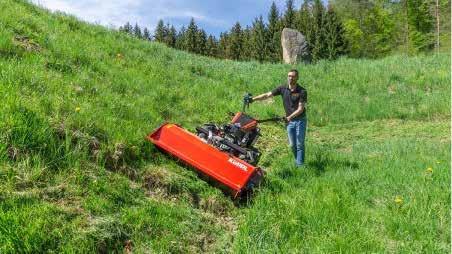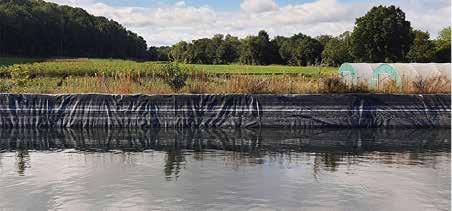
2 minute read
Innovative 2-wheel tractors from Koppl
Multi-award-winning German manufacturer Koppl have an exciting range of interchangeable products which are available in the UK from PSD Groundscare.
Designed to revolutionise groundscare by minimising the need for several different machines, the range helps to reduce both storage space and costs.
Advertisement
The smaller Koppl Hydro Compact Easy, with its space saving design, is a flexible and convenient unit for all professional needs and multi-season use.
Available with a wide range of powerful attachments, it offers a solution to even the toughest conditions including, weed clearing, blowing and snow clearing. It also boasts a range of attachments specifically for synthetic groundscare, including various sweepers and brushes.
Additionally, the larger Compact Light and Compact Comfort models offer strong powerful units designed to withstand the rigours of the professional user with varying solutions for clearance work and mowing including on steep slopes.
For heavy landscaping applications including stone burial, the Luchs Hydro is the ideal solution with its powerful, narrow design which delivers outstanding manoeuvrability and flexibility.
Koppl also continue to develop their range of E-Power equipment, building on the popular Compact Easy E-Drive power unit with the Compact Comfort E-Drive which offers a powerful power unit for operating a range of landscaping and groundwork attachments. The available solutions include mowers, brushcutters, sweepers and weed removal, all suitable for the rigorous use in the professional market. Benefits of E-Power battery machines include:
• Quieter working environments – for operators and the public
• Reduced hand arm vibrations –helping to safeguard the operator
• Reduced carbon footprint and emissions – kinder to the environment and the operator
• Lower running costs – it’s cheaper to charge up a battery than to buy fuel
• No fuel storage – or purchase of flammable liquids required.
Koppl have been manufacturing since 1896 and produce an extensive range of implement carriers (5.7hp – 23hp) and attachments including sweepers, rotavators and mowers to suit individual specific needs.
THE NATIONAL DROUGHT GROUP IS PREPARING FOR THE WORST-CASE SCENARIO OF ANOTHER HOT, DRY SUMMER AND IS URGING WATER COMPANIES AND INDIVIDUALS TO REDUCE LEAKAGE, DECREASE WATER CONSUMPTION AND FIND NEW WAYS OF BEING RESILIENT TO DROUGHT.
In alignment with Water Saving Week, the Horticultural Trades Association (HTA) is urging necessary action on water management grants to increase the industry’s resilience to droughts and encourage more businesses to reduce their reliance on mains water.
The National Drought Group met last month to discuss the critical need to focus on water resource preservation to reduce the risk of drought measures in the future.
A very dry February, followed by an exceptionally wet March and unsettled April, emphasise that businesses cannot rely solely on the weather and preserving water to prevent future drought measures needs to become the priority.
While much of England is in a considerably better position than last year with reservoir capacity across the UK at 94% as of the beginning of April, East Anglia, Devon, and Cornwall remain in drought and face temporary use bans.
The National Drought Group is preparing for the worst-case scenario of another hot, dry summer and is urging water companies and individuals to reduce leakage, decrease water consumption and find new ways of being resilient to drought.
On 4 April, the government published their ‘Plan for Water’, which outlines measures to increase drought resilience and ease water supply pressure.
It aims to take a systematic, local, catchment-based approach, using nature-based solutions and infrastructure investment. This is welcomed by the horticultural industry, which relies on water to flourish.
The HTA is encouraging horticultural businesses to reduce their reliance on mains water through the use of rainwater capture technology.
The current Water Management Grants from Defra are open to horticultural businesses growing or planning to grow








